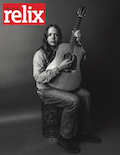Swing Time: Theo Croker

Photo Credit: Bruno Barreto
As a teenager in the 1920s, the legendary jazz trumpeter Doc Cheatham joined the Barnum & Bailey Circus to pursue his passion for music and outrun his family’s plans for a career in medicine. Cheatham routed his way from circuit to circuit for years before he blew into Chicago, where pivotal encounters with King Oliver and Louis Armstrong inspired a lifetime of guiding the development of swing.
In 2007, Theo Croker reprised his grandfather’s leap of faith by following his diploma from the Oberlin Conservatory of Music to a new life in Shanghai.
“It gave me a more worldly understanding of what my sound is and how to use it,” Croker recalls of his seven formative years in China, where he found that “jazz was the word for Black music,” from hard bop to hip-hop. “When I arrived, all I wanted to do was play swing, so when I realized, ‘Man, they’re receptive to everything here,’ it really opened up my mind to see it from that perspective.”
Croker’s early embrace of sonic heterodoxy has been key to his emergence as one of his generation’s most vital voices. Since his return to Leesburg, Fla., the 39-year-old trumpeter, producer and composer’s mission to reconnect jazz with its stylistic descendants has led him to collaborations with Common, J. Cole, Ari Lennox and the Berlin Philharmonic, while remaining firmly rooted in his straight-ahead foundations. He credits his commitment to the classics to his conservatory instructors Donald Byrd, Marcus Belgrave and Gary Bartz, crossover giants who taught him the fundamental importance of fluency in jazz tradition.
“I’m still like that now,” he reflects. “If I’m studying, I’m studying the language of bebop, which is really the ultimate Black vocabulary for music.”
In June, Croker found new depths of personal significance in his genre defiance with Dream Manifest, a freely flowing expression of his “musical dreams and inspirations in this moment.” His eighth album as a leader channels a trance of post-bop, neo-soul, house and cosmic avant-garde from his innermost self by heeding on-the-spot impulses over lead sheets. “I wanted to see what would happen if a band that had done 125 shows that year got in the studio with just a few scratch ideas,” he shares. “Because we had so much experience understanding each other creatively, we didn’t have to work on connecting. We just had to work on saying, ‘OK, where’s this gonna land musically?’
“Sometimes we’d play the song for 30 minutes while I came up with the melody,” Croker continues, describing the meditative sessions that let the quintet summon their unfiltered feelings. “When it came to me, boom, I’d make the melody statement, and cats in the band would know ‘cause we’re a band. They’d be like, ‘Oh, this is the head. He finally found it. Let’s go.’ Then we’d use that part for the song.”
The trained instincts Croker trusted in the studio simmer in his patient, ardent tone across the record. As he navigates a balance between his embodied and spiritual urges— from the club-ready pulse of “we still wanna dance” with electronic producer D’LEAU to the dusky incantation of “one pillow,” featuring former classmate and longtime collaborator Kassa Overall—his horn’s agile runs and wistful held tones radiate total presence. His openness is most profound on “light as a feather,” which centers around a gripping, lyrically melodic exchange with Bartz captured on the first take. “That’s Gary Bartz 101,” Croker notes. “‘We’re not improvising, we’re spontaneously composing together as an ensemble.’ He’d say that all the time in class, and I really took it to heart.”
“At this stage in my life, I’ve learned that I cannot fight inspiration because inspiration is a divine thing,” he reflects. “This whole record is full of that.”
Through the time-honored tradition of surrendering to the moment of creation, Croker’s hypnotic revelations on Dream Manifest translate the many sides of his musical identity to a common tongue. “Then it’s about having the courage and the humility to explore that,” he says, “and to make a statement with it that’s full of integrity and good enough for a recording—something that’s gonna last forever.”
Though his music thrives by reconnecting the past and the present, Croker works without concern for jazz’s future. He’s not interested in being a torch bearer for the genre, and he holds that all efforts to define its scope are necessarily limiting. However, he’ll submit that the core of his dialect is the freedom to pursue unpredictable ideas and the chops to make them lucid and meaningful.
“The deeper you go in the tradition, the further forward you can go,” he says. “The canon is the canon. It may seem like we’re adding to it, but in a decade, a 12 year old who discovers my music and does his homework is going to find the Roy Hargrove influence, the Gary Bartz influence, the Donald Byrd influence, the Miles influence. It’s that same vocabulary, that same language, just echoing out.”





















